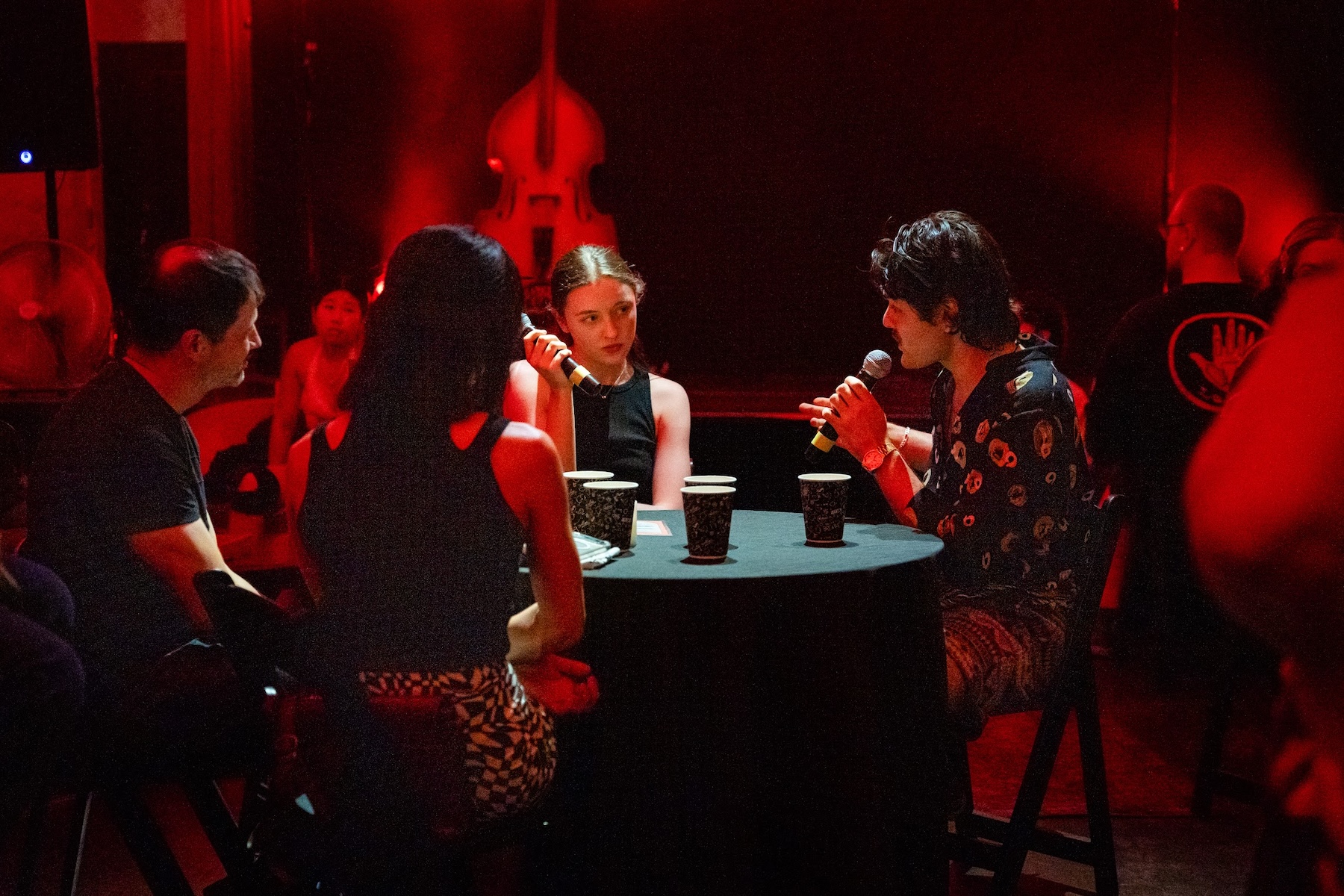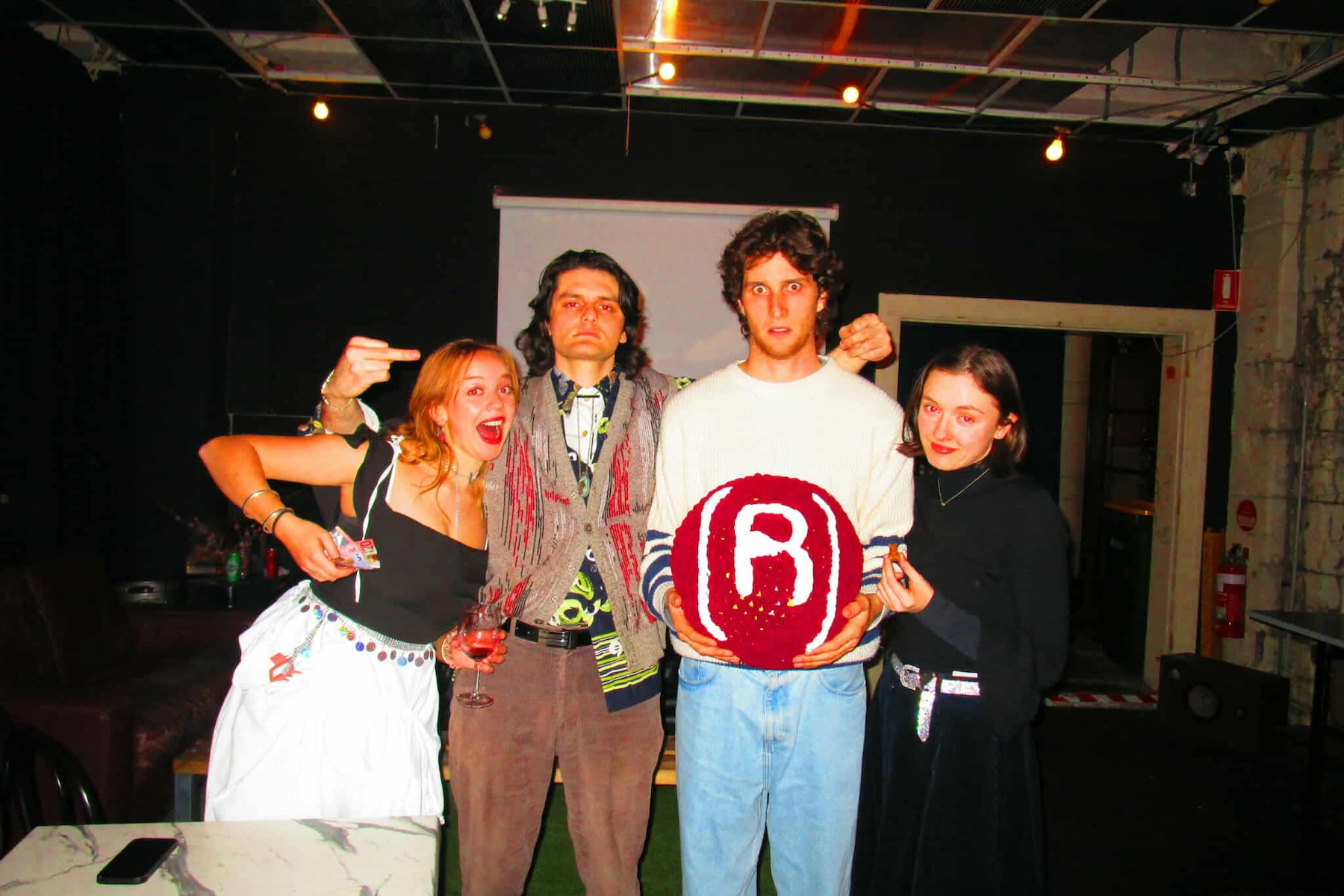‘If the show’s not good, your night’s ruined’: Rotpunkt want to redefine Adelaide theatre-going
Four Flinders drama graduates hope to make theatre more accessible and exciting for younger audiences through anarchic live shows that aim to be as “current, electrifying, and as unrecorded as possible”.

The risk-to-reward ratio for birthday party speeches often runs high. A proud parent might burst into happy/sad tears; an uncle might excessively describe an in-law’s neckline; a finance friend might bring up a lewd story from the last team-building retreat; or an MC starts to test out their tight five for a wedding next week.
At Rotpunkt’s 1st Birthday Party however − hosted within the suitably avant-garde Arthur Artbar − this fledgling collective are celebrating something potentially even more ruinous than passing around the microphone: making independent theatre in Adelaide.
Rotpunkt was founded in a west end basement bar in 2024 by four Flinders Drama Centre graduates: Lauren Jones, Shant Becker, Franca Lafosse, and Luke Furlan. Since then they have had quite a year; in September 2024 they staged their first original full-length play, H, at Slingsby’s Hall of Possibilities, and hosted the first of their immersive variety nights, Club Rotpunkt, at the Queens Theatre in February, with another slated for August.
The group’s name is a term borrowed from the rock-climbing world, that translates from German as ‘Red Point’. To ‘Red Point’, Becker says, means “to climb something, having failed or practiced before… and to climb something at your limit.”
Jones puts it more bluntly: “It sounds like Rot, it sounds like Punk. Nice.”

Becker says the group’s name and raison d’être emerged from the desire to avoid the pitfalls common to fresh drama school graduates. Crucially, the collective observed a current lack of non-Fringe theatre in Adelaide that catered to their generation – they’re all in their early-to-mid 20s – and those who may attend live music or other performances, but feel alienated by theatre’s perceived ‘elite’ or highbrow status.
Lafosse says that many of her peers associate theatre with “high school or homework”. “Or it’s too complicated, and if I don’t understand it, it’s my fault,” says Lafosse, who made her mainstage debut in State Theatre Company South Australia production Housework in February.
Furlan notes that his target audience is the “person with the friend who went to drama school” but who has never been to the theatre − hinting at the industry-wide struggle for new audiences in the live arts post-COVID.
"Adelaide always has this question of ‘is it the world coming to Adelaide, or Adelaide coming to the world? We want to make our shows as live, current, electrifying, and as unrecorded as possible."
The collective are openly about avoiding the lure of featuring their work in the Fringe, citing the familiar, intergenerational conundrum of how to sustain Adelaide’s ‘Fringe vibe’ throughout the year. They are also conscious of the indie start-ups before them who have also attempted to reach that near-mythical second-tier of Adelaide’s professional theatre – The Border Project holds particular interest for Lafosse as an example of a more multicultural potential in Australian theatre.
“Adelaide always has this question of ‘is it the world coming to Adelaide, or Adelaide coming to the world?’,” Furlan reflects. “We want to make our shows as live, current, electrifying, and as unrecorded as possible.”
Subscribe for updates
There’s consensus around the table, and reflected in Rotpunkt’s programming, that what the theatre needs is the combination of an accessible price point and an approachable, entertaining evening; where the performances happen around the audience’s night at the bar – staffed by the collective themselves — rather than in a hushed auditorium. The company attributes their early productions’ successes to creative mentors Chris Drummond and Geoff Cobham, and Helpmann Academy’s Creative Innovator program, which partners ambitious young artists with accountants to form an effective business plan and sustainable operating model.
Furlan notes that prices alone can prevent young people attending art in a cost-of-living crisis. “When people go to commercial theatre they’re often spending upwards of $100 a ticket. We found that when we were looking at price points − even smaller ones − it’s your whole night, and if the show’s not good, your night’s ruined. We wanted to open it up to multidisciplinary artists, but also an idea to making theatre a part of a night out.”
The first speech at Rotpunkt’s birthday party is allocated to its seemingly most sensitive member. Furlan becomes visibly overwhelmed as he attempts an a cappella rendition of ‘Fly Me to the Moon’ – and an accomplice starts manipulating his pitch through the sound desk.

The industry associates and peers that have gathered share perplexed gazes, before it becomes clear that ‘a bit’ is forming. The other speeches unfold in much the same subversive way: Lafosse’s increasing desperation as she reads out answers to the question “what does community mean to you” from her Instagram messages, searching for a clincher/poetic finish; Becker’s elaborate portrayal of the domineering auteur by giving his brother a written speech to read on his behalf; and Jones’s pointed rationalisation of their slight increase in ticket price whilst announcing their next show — ‘we didn’t get the grant’.
While much of Rotpunkt’s work and publicity is laced with irony, the collective’s enthusiasm for compelling theatre is tantalising. Their biting and absurd depiction of the allure of fascism in H was inspired by the realisation that Furlan (Italian), Becker (German/Indian), and Lafosse’s (Argentinian) family backgrounds all share ties to countries with historic associations with fascism. It prompted an early version of the work during their studies at Flinders, centred on the premise, ‘what if Hitler and Mussolini were alive in Argentina?’, as seen from the perspective of these exiled dictators’ hypothetical grandchildren. The collective’s pleasure in wryly interrogating their multicultural backgrounds also mirror their Club Rotpunkt variety shows, which fuse the casual allure of cabaret with the multidisciplinary chaos of the Fringe.
After witnessing the twerking-laden conclusion of their first birthday party, Rotpunkt emerges as a collective that is eager to take risks and revel in the danger. A night in their world leaves no illusions that the work of building audiences and community will be difficult; that producing things off your own back takes time and energy, and it may only be a matter of time before its members follow the well-trod path for the young and iconoclastic − how many before them have quickly leapt from DIY successes to the mainstage, moved to Melbourne or Sydney, or burned out and left the industry entirely?
But for now, Rotpunkt are hungry, fun, and they want you to join them at the cliff-face.
Rotpunkt presents Club Rotpunkt 2 at Nexus Arts Centre on August 30
Want to see more stories from InDaily SA in your Google search results?
- Click here to set InDaily SA as a preferred source.
- Tick the box next to "InDaily SA". That's it.
Free to share
This article may be shared online or in print under a Creative Commons licence

